I love ginger water. I truly do. Most days, I pour a glass of ginger water to settle my stomach before bed. You're probably thinking to yourself, "Ginger…water? Isn't that just plain water?" Well, no, not exactly. Ginger water is made up of 2 things: water and ginger.

Plain water is healthy enough on its own by hydrating you and replenishing lost electrolytes — but that's about it. The real benefits of drinking this seemingly simple beverage come from ginger.
Jump to:
Ginger Lovers Unite!
Are you ready to embark on a ginger-filled adventure with a burst of flavor? Discover a world of enticing ginger recipes that will tantalize your taste buds.
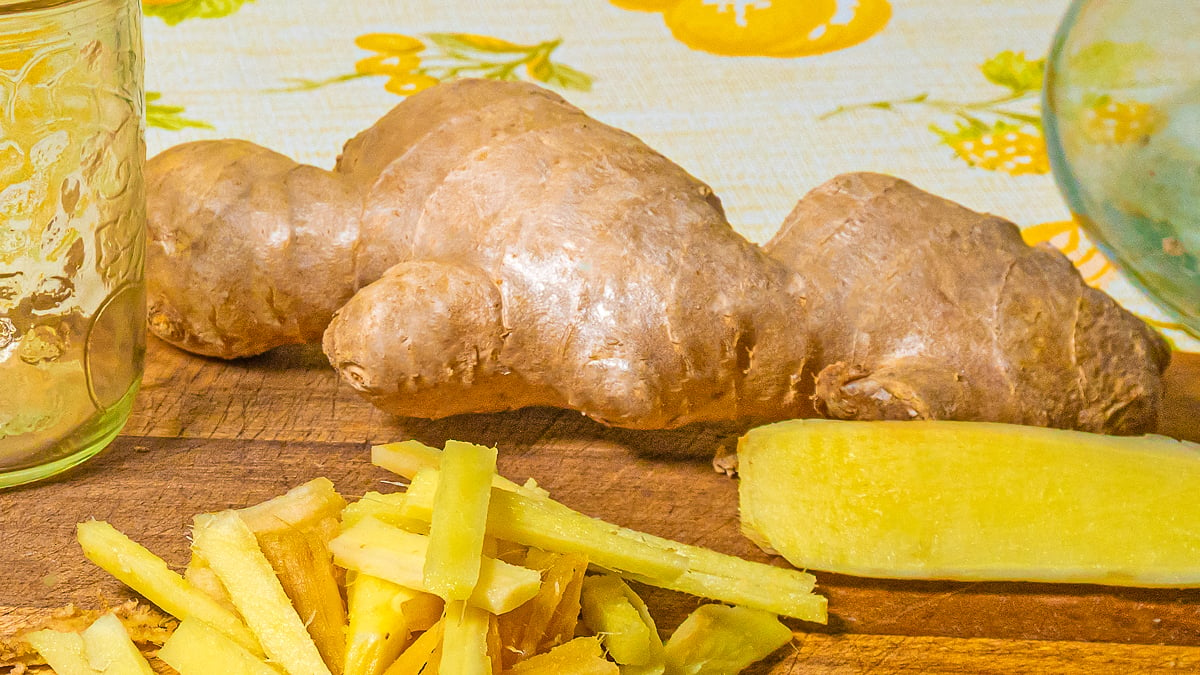
From the invigorating Honey Fermented Ginger and refreshing Ginger Shots to the vibrant fusion of Lemon Fermented Ginger Honey, there's a recipe for everyone. Add a touch of magic with versatile Ginger Syrup, and indulge in the cozy comfort of Fresh Ginger Tea.
With these enticing options, you can explore ginger's remarkable flavors and health benefits in one exciting culinary journey. Get ready to unlock the full potential of ginger and elevate your culinary creations to new heights.
What is ginger water?
Ginger water is flavored water infused with ginger root extract and sometimes lemon, enjoyed at room temperature or cold. It's a great way to get the health benefits of ginger without having to eat it. It's also a great morning drink because it gets you started on the right foot before you start your day.
Why Make ginger water
It's no secret that ginger water can help you feel better. Gingerol is the compound that gives ginger its punch! It has been used as a spice, a supplement, a flavor component, and a natural remedy. If you want to enjoy the nutrients and flavors of ginger, make a pitcher of it and keep it in the fridge.
This article details the nutrition and side effects benefits of ginger water. Since I am not a medical professional, I make it a point to point to peer-reviewed research and studies for recipes that can help us. Is it a placebo? I can't be sure, but I has a lot more perks than store-bought ginger ale!
Ginger water is a fantastic way to start your day because it can help you stay energized all day. Plus, it's easy to make!
Ingredient Notes
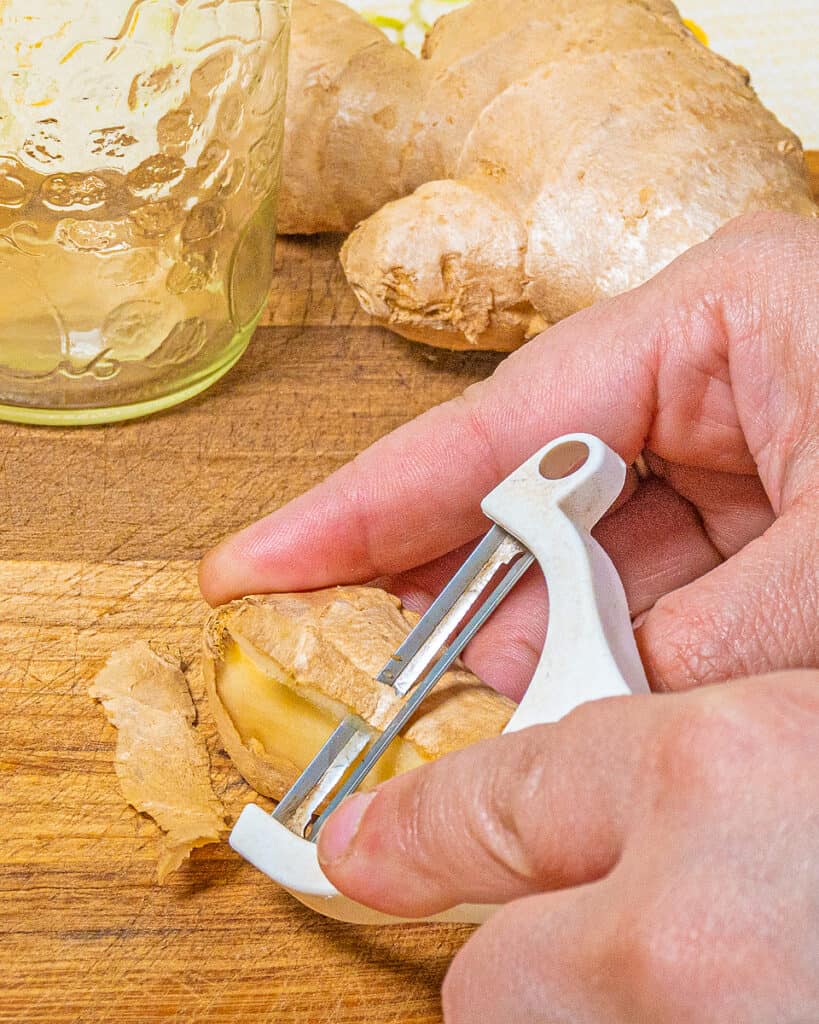

Fresh sliced ginger: Fresh ginger root is best for this recipe because it will add the most flavor. If you don't have a mandoline, use the thinnest setting on your vegetable peeler and slice off thin strips of ginger root. You can use dry ginger powder, which may result in a less intense flavor.
If you like ginger, try making some fermented ginger honey, ginger tea, or other easy beverages.
Water: Use filtered water to ensure your drink is as clean and pure as possible. Set aside a few cups of water if you want to make a batch ahead of time.
Lemon slices: Lemons add a nice tartness that balances out the sweetness of honey or sweetener of choice (optional). If you don't have fresh lemons, use bottled lemon juice instead--make sure it doesn't contain any added sugars or preservatives!
Honey or sweetener of choice (optional): You can use honey or another sweetener, such as maple syrup or stevia extract if you prefer not to use sugar in your drinks; remember that these options are more calorie-dense than plain old white sugar so keep that in mind when choosing how much to add!
How Do You Make Ginger Water?
First, slice the ginger into thin slices (I keep the peel on) and add some ginger root into a small saucepan on the stove.

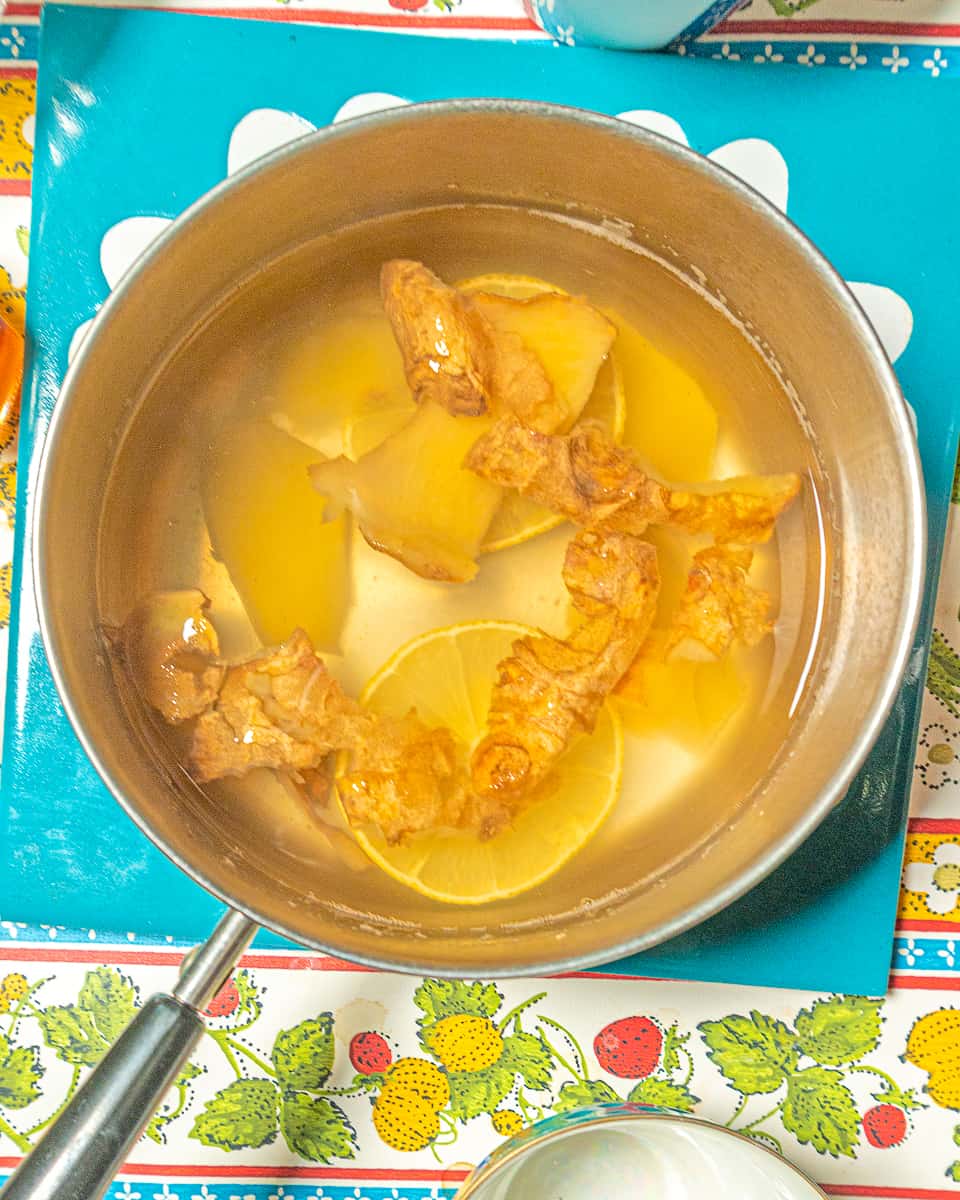
Briefly bring it to a boil, then simmer until your desired flavor and potency have been reached).
I like to steep them for about 10 minutes and add a few slices of lemon. Then strain out the ginger pieces with a fine mesh strainer or tea steeper. Next, you can strain the pulp with cheesecloth or a mesh strainer (you can save this to make ginger tea later).
Add some honey (if desired), stir together, and enjoy! Like that, you've got yourself a delicious glass of healthy ginger water!


What If You Don't Like Bits?
People often ask, "What if I don't like bits in my ginger water?" If this is you, there are a few ways you can strain the ginger water to remove those bits.
- Strain with a mesh strainer: A mesh strainer will catch all the larger pieces of ginger so that they aren't included in your final product. This is what I use most often because it's easy and effective.
- Strain with a coffee filter: This method works similarly to filtering coffee grounds out of hot water, only now your hot liquid is cold instead of hot (which makes sense because we're talking about infusions here).
- Simply place two layers of paper towels over the top of each other (or one layer if it's too thick), then fold down one side and place on top of an empty bowl or cup; pour your infusion into this "filter" then slowly lift from underneath until all liquid has dripped into its receptacle below. If reusable, discard spent material by throwing away used paper towels or rinsing out filters/papers.
- Repeat as needed until no more sediment remains behind in the bottom chamber holding filtered liquid above ground level; add remaining ingredients as desired before serving warm beverages directly from pre-filled glasses!
What If You Don't Like The Taste?
People have different tastes, so if you don't like the taste of ginger water, try making it with other ingredients. For example, we've seen lemon, lime, and herbs like mint used instead of ginger. Cucumber is also an option—we recommend adding some lemon or honey for sweetness.
Orange is another great flavor for this drink: add lemon for tartness or grapefruit for sweetness.
Variations
Ginger water is a refreshing drink that you can make with the help of ginger root and lemon. However, there are many variations to ginger water recipes.
Turmeric, ginger & cayenne
You can add turmeric powder and a teaspoon of cayenne to your pitcher of ginger water for added health benefits. Turmeric has anti-inflammatory properties and improves both digestion and immune support.
Lemon honey & ginger
Add honey to the lemon-ginger mixture for an extra boost of sweetness along with its health benefits. Honey contains antioxidants that help fight free radicals in the body and reduce inflammation. It also has vitamin C, which contributes to immunity support.
Pineapple & ginger
Pineapple makes a great addition to your ginger water recipe if you like tropical flavors. Bromelain is an enzyme found in pineapples that helps digest proteins better than fruit juices alone do.
Expert Tips
Here are the expert tips, including citations from relevant studies and medical sources:
- Health benefits: Ginger water has numerous health benefits, including alleviating nausea 1, morning sickness during pregnancy 2, helping stabilize blood sugar levels 3, and supporting the immune system 4.
- Nutritional values: This recipe contains carbohydrates, protein, potassium, sodium, and calcium 5.
- Flavor variations: Add a few drops of lime juice or a cinnamon stick to the ginger water to enhance the flavor and add an extra layer of depth 6.
- Infused with mint: Add fresh mint leaves to your ginger water for a refreshing twist 7. Mint leaves provide additional health benefits, help with digestion, and add a cooling flavor 8.
- Spice it up: For a spicier drink, consider adding a pinch of cayenne pepper to your ginger water 9. This addition not only adds a kick but also boosts the detoxifying properties of the drink.
- Serve in mugs: Enjoy your ginger water in a large mug to keep it warm and to hold the additional ingredients, such as cinnamon sticks and mint leaves, in place while you sip.
- Morning sickness remedy: Pregnant women experiencing morning sickness can benefit from ginger water, as it helps alleviate nausea and vomiting 2. Always consult your doctor before trying new remedies during pregnancy.
- Substitute for monounsaturated fat: If you're looking for a healthy drink low in fat, ginger water is an excellent option, as it's free of monounsaturated fat 5.
- Regulate fiber intake: While ginger water doesn't contain any fiber, it can be consumed as part of a healthy diet. Pairing your ginger water with a balanced meal can provide an appropriate mix of nutrients that includes fiber and protein 5.
Sources:
- Ernst, E., & Pittler, M. H. (2000). Efficacy of ginger for nausea and vomiting: a systematic review of randomized clinical trials. British Journal of Anaesthesia, 84(3), 367–371. Link ↩
- Viljoen, E., Visser, J., Koen, N., & Musekiwa, A. (2014). A systematic review and meta-analysis of the effect and safety of ginger in the treatment of pregnancy-associated nausea and vomiting. Nutrition Journal, 13, 20. Link ↩↩2
- Arablou, T., Aryaeian, N., Valizadeh, M., Sharifi, F., Hosseini, A. F., & Djalali, M. (2014). The effect of ginger consumption on glycemic status, lipid profile and some inflammatory markers in patients with type 2 diabetes mellitus. International journal of food sciences and nutrition, 65(4), 515-520. Link ↩
- Chang, J. S., Wang, K. C., Yeh, C. F., Shieh, D. E., & Chiang, L. C. (2013). Fresh ginger (Zingiber officinale) has anti-viral activity against human respiratory syncytial virus in human respiratory tract cell lines. Journal of ethnopharmacology, 145(1), 146-151. Link ↩
- Basic Report: 11216, Ginger root, raw. (2018). National Nutrient Database for Standard Reference Release 28. United States Department of Agriculture (USDA). Link ↩ ↩2 ↩3
- Tapsell, L. C., Hemphill, I., Cobiac, L., Patch, C. S., Sullivan, D. R., Fenech, M., ... & Inge, K. E. (2006). Health benefits of herbs and spices: the past, the present, the future. The Medical journal of Australia, 185(4), S1. Link ↩
- McKay, D. L., & Blumberg, J. B. (2006). A review of the bioactivity and potential health benefits of chamomile tea (Matricaria recutita L.). Phytotherapy Research: An International Journal Devoted to Pharmacological and Toxicological Evaluation of Natural Product Derivatives, 20(7), 519-530. Link ↩
- Merat, S., Khalili, S., Mostajabi, P., Ghorbani, A., Ansari, R., & Malekzadeh, R. (2010). The effect of enteric-coated, delayed-release peppermint oil on irritable bowel syndrome. Digestive diseases and sciences, 55(5), 1385-1390. Link ↩
- McCarty, M. F., DiNicolantonio, J. J., & O'Keefe, J. H. (2015). Capsaicin may have important potential for promoting vascular and metabolic health. Open Heart, 2(1), e000262. Link ↩
📖 Recipe
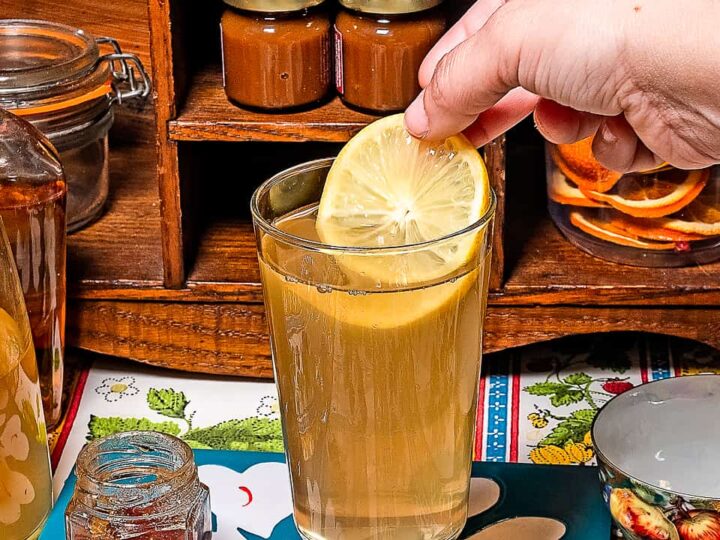
Ginger Water
This ginger creates a delicious drink that's packed with flavor.
Ingredients
- 6 Cups Water
- ¾ Teaspoons Grated Ginger
Instructions
- Briefly bring it to a boil, then simmer until your desired flavor and potency have been reached). I like to steep them for about 10 minutes and add a few slices of lemon.
- Then strain out the ginger pieces with a fine mesh strainer or tea steeper.
- Next, you can strain the pieces or pulp with cheesecloth or a mesh strainer (you can save this to make ginger tea later)
- Add some honey (if desired), stir together, and enjoy! Like that, you've got yourself a delicious glass of healthy ginger water!
Nutrition Information:
Yield:
6Serving Size:
1Amount Per Serving: Calories: 0Total Fat: 0gSaturated Fat: 0gTrans Fat: 0gUnsaturated Fat: 0gCholesterol: 0mgSodium: 10mgCarbohydrates: 0gFiber: 0gSugar: 0gProtein: 0g

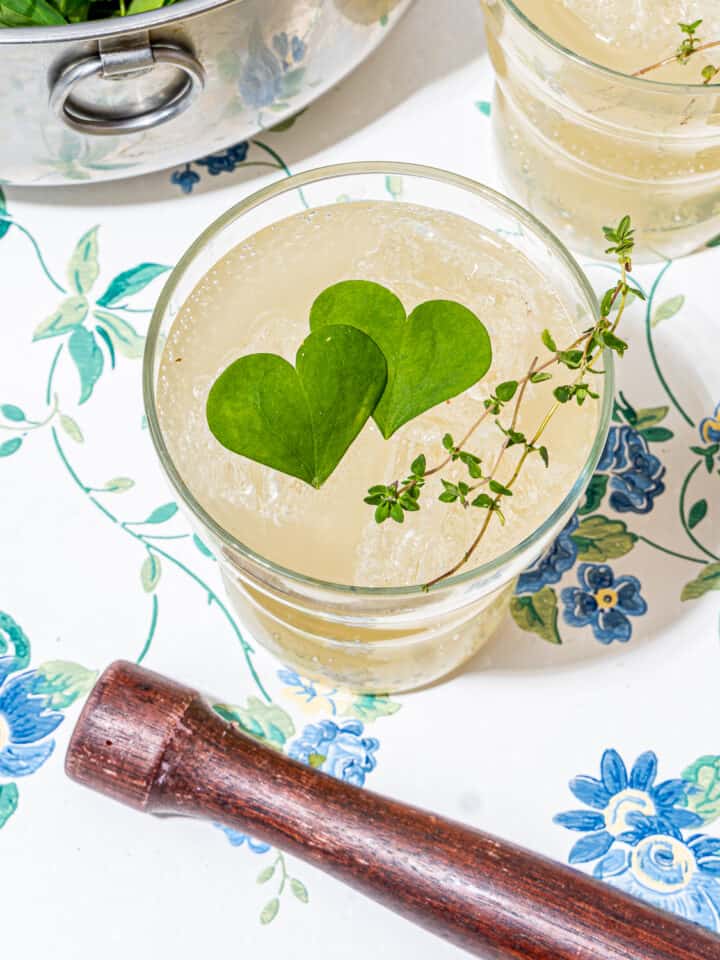
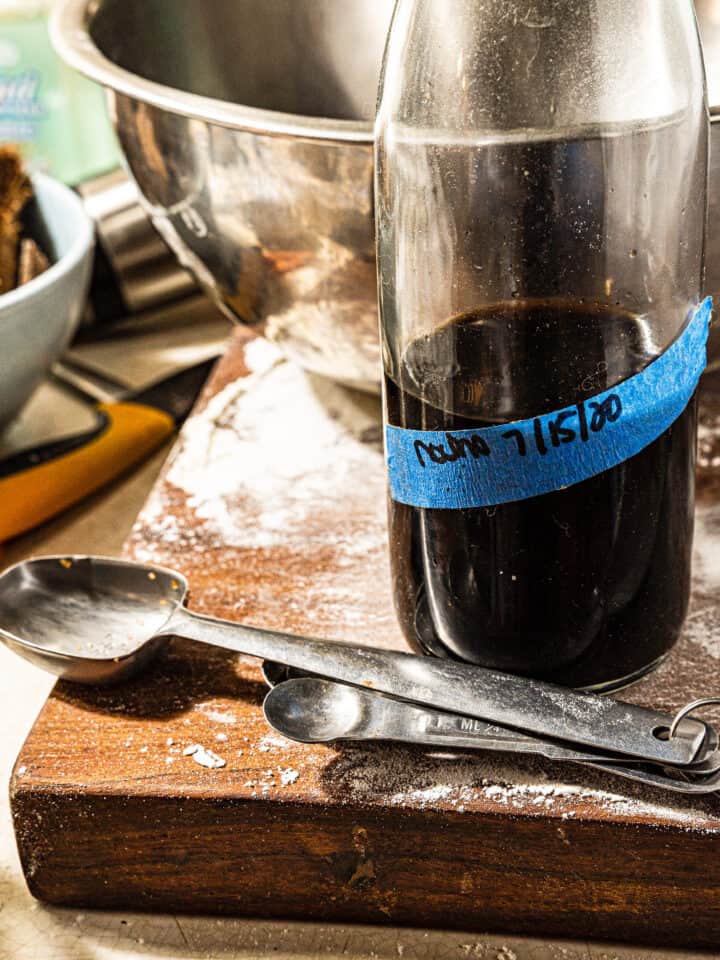
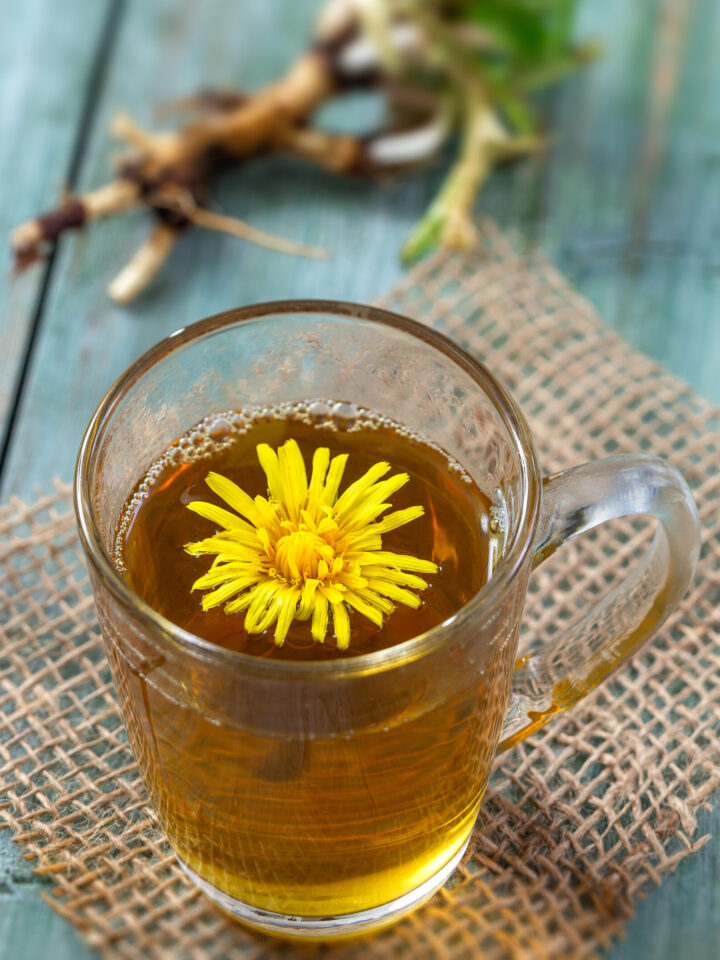
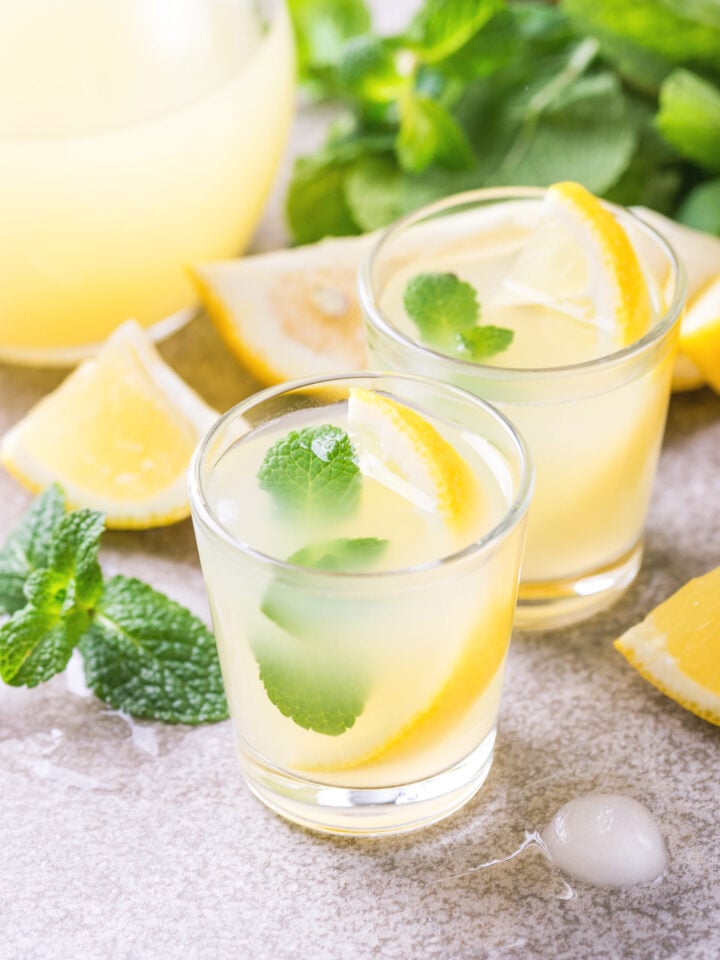

Kitchenhutt Spices says
Thank you for sharing this informative one. Contact us if you want to order spices online at wholesale price...